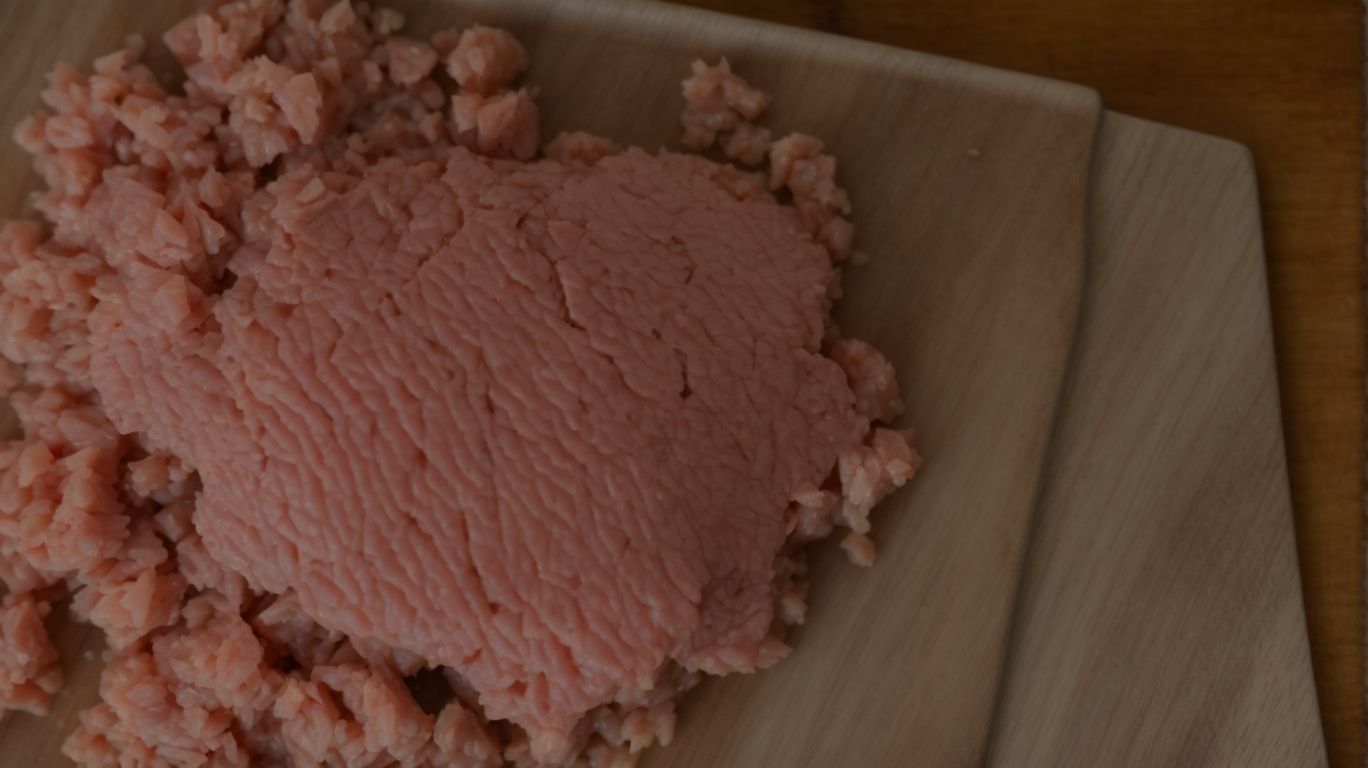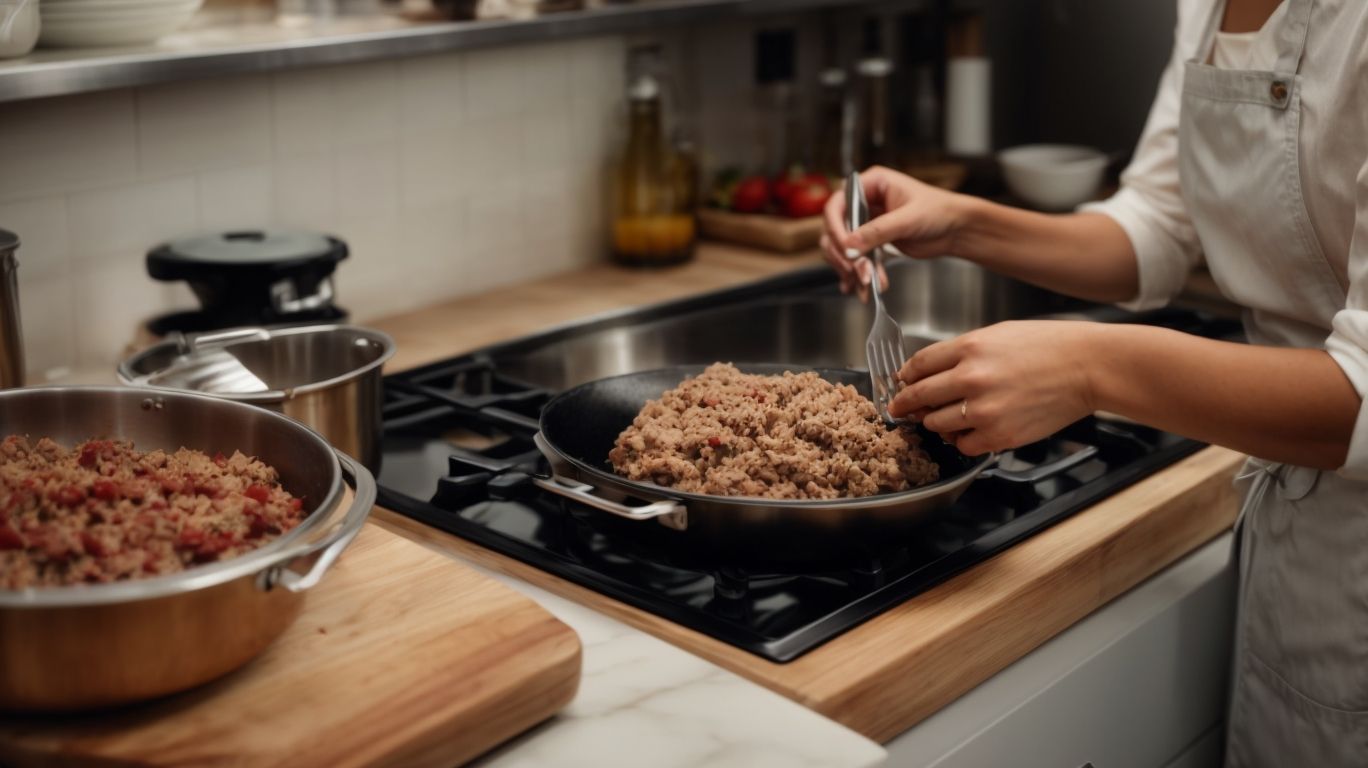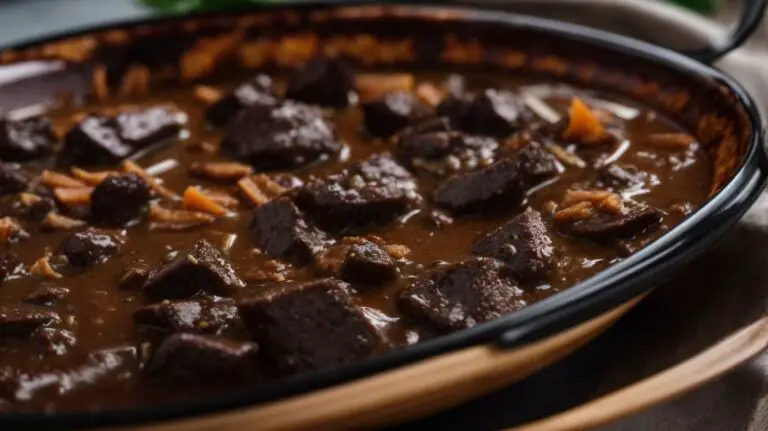How to Cook Ground Turkey for Dogs?
Are you looking for a healthy and nutritious option to feed your furry friend? Ground turkey for dogs could be the answer!
We will explore the benefits of feeding ground turkey to dogs, how to choose the right ground turkey, proper storage methods, cooking tips, and creative serving ideas.
Whether you’re a seasoned chef or a pet parent looking to provide the best for your dog, this article will guide you through everything you need to know about cooking ground turkey for your canine companion.
Key Takeaways:
Why Should You Cook Ground Turkey for Dogs?

Credits: Poormet.Com – William Rodriguez
Cooking ground turkey for dogs is a beneficial way to provide them with a healthy and nutritious meal. By preparing homemade meals, you can ensure that your canine friend receives a balanced diet with the right nutrients.
Ground turkey is an excellent source of protein, which is vital for muscle development and overall health in dogs. When you cook it yourself, you have control over the ingredients, avoiding any additives or preservatives that might be present in commercial dog food. This can help in preventing potential allergies or intolerances.
Homemade turkey meals can be tailored to suit your dog’s specific dietary needs, ensuring they get a well-rounded diet. By cooking ground turkey at home, you also get the satisfaction of providing your furry companion with a fresh and flavorful meal.
What Are the Benefits of Feeding Ground Turkey to Dogs?
Feeding ground turkey to dogs offers numerous benefits, including a healthy source of protein, essential nutrients, and lean protein that supports their overall well-being and vitality.
Ground turkey is a great option for dogs due to its high protein content, which is essential for maintaining strong muscles and a healthy immune system. It is a lean protein source, making it ideal for dogs that require a low-fat diet. Incorporating ground turkey into your dog’s meals can help them stay energized and active throughout the day.
Ground turkey is rich in important nutrients like iron, zinc, and B vitamins, which are crucial for your dog’s overall health and well-being. These nutrients support various bodily functions, such as metabolism, digestion, and cell growth.
How to Choose the Right Ground Turkey for Your Dog?
Selecting the right ground turkey for your dog involves considering factors such as the quality of ingredients, nutritional composition, and suitability for your pet’s dietary requirements. Consulting with a veterinarian can help ensure you make a safe and informed choice.
When choosing ground turkey for your furry friend, it’s essential to opt for lean varieties without added seasonings or flavorings that may be harmful to dogs. Quality turkey meat should be free from preservatives, additives, or artificial colors. Ensure the product is labeled specifically for pet consumption, as some human-grade products can contain ingredients like onions or garlic, which are toxic to dogs. Assess the nutritional content, aiming for high protein levels and low fat content to support your dog’s health.
What to Look for in the Ingredients List?
When examining the ingredients list for ground turkey dog food, prioritize high-quality, nutrient-dense ingredients that contribute to a balanced diet. Opt for human-grade ingredients that are safe for consumption by your canine friend.
Human-grade ingredients are essential for ensuring that your pet is receiving food that is of a quality fit for human consumption. This provides a higher level of safety and nutritional value for your furry companion.
Quality should be the top consideration when selecting ground turkey dog food ingredients. Look for proteins, fats, vitamins, and minerals that offer a well-rounded profile. To maintain dietary balance, aim for a mix of ingredients that cater to your dog’s specific needs, such as age, size, and activity level.
What to Avoid in the Ingredients List?
It is crucial to avoid harmful ingredients in ground turkey dog food, such as bones, allergens, and contaminants like salmonella and campylobacter that can pose health risks to your pet. Prioritize safe and clean ingredients to ensure your dog’s well-being.
-
When preparing homemade ground turkey dog food, be cautious about including bones as they can splinter and cause internal injuries to your furry friend.
-
Avoid common allergens like wheat, corn, and soy, which can trigger sensitivities or allergies in dogs, leading to skin issues or digestive problems.
-
Another key consideration is bacterial contamination; ensure proper handling, cooking, and storage to prevent the growth of harmful bacteria like salmonella and campylobacter.
How to Properly Store Ground Turkey for Dogs?

Credits: Poormet.Com – David Mitchell
Properly storing ground turkey for dogs is essential to maintain its freshness and nutritional integrity. Be sure to store it in a cool, dry place or freeze it for extended shelf life, following safe food handling practices recommended by veterinarians.
Temperature control is crucial in preserving the quality of ground turkey dog food. Ideally, it should be kept in the refrigerator at a temperature below 40°F to prevent bacterial growth and spoilage. If storing for a longer period, freezing is a highly effective method. Freezing ground turkey not only extends its shelf life but also helps to retain its nutritional value. Package the food in airtight containers or freezer-safe bags before freezing to maintain its freshness.
Safe handling practices are equally important to ensure the health and safety of your pet. Avoid cross-contamination by storing raw ground turkey away from other foods and always wash your hands, utensils, and surfaces thoroughly after handling it. Remember to defrost frozen food in the refrigerator to prevent harmful bacterial growth.
What Is the Best Way to Keep Ground Turkey Fresh?
Maintaining the freshness of ground turkey for dogs involves storing it in airtight containers, refrigerating promptly, and avoiding exposure to heat or water that can lead to contamination. These practices help preserve the quality and safety of the food.
In terms of airtight storage, invest in containers that seal tightly to keep air and moisture out, preventing the growth of harmful bacteria. Place the ground turkey in the container and press out any excess air before sealing it. Refrigeration is crucial to slow down bacterial growth, so it’s recommended to store the dog food in the coldest part of your fridge, usually the lower shelves. Be mindful of cross-contamination by keeping it separate from other foods.
How Long Can Ground Turkey Be Stored in the Fridge?
Ground turkey can be safely stored in the fridge for up to 2-3 days before it should be consumed or frozen to maintain its freshness. Following proper storage guidelines recommended by veterinarians ensures the food remains safe for your dog.
Veterinarians suggest that after the 2-3 day mark, ground turkey dog food can start to spoil, leading to potential health risks for your pet. To ensure optimal storage, it’s essential to place the cooked turkey in an airtight container or freezer-safe bag before refrigerating it.
It is advisable to cool the cooked turkey within two hours of preparation, as this helps to prevent bacterial growth and maintain food safety standards. Make sure to thaw frozen ground turkey in the refrigerator, not on the countertop, to avoid bacterial contamination.
Can You Freeze Ground Turkey for Dogs?
Freezing ground turkey for dogs is a convenient way to extend its shelf life and preserve its nutritional value. Properly packaged frozen ground turkey can be a practical option for ensuring your pet always has a fresh meal available.
In terms of freezing ground turkey dog food, the benefits extend beyond just convenience. The freezing process not only helps in preventing bacteria growth but also locks in the essential nutrients that might degrade over time. By properly freezing the *ground turkey*, you are essentially stopping the clock on its deterioration, allowing you to have a stockpile of ready-to-serve meals for your furry companion.
Frozen ground turkey dog food can be a cost-effective solution, as buying in bulk and freezing portions can help you save money in the long run. This method also enables you to prepare larger batches of nutritious meals, ensuring that your dog receives a balanced diet consistently.
How to Cook Ground Turkey for Dogs?

Credits: Poormet.Com – Paul Rodriguez
Cooking ground turkey for dogs requires attention to detail and a focus on safe preparation methods. Using a pot to simmer the meat with minimal added ingredients like olive oil can help maintain its nutritional value while ensuring the elimination of harmful bacteria.
Start by browning the ground turkey in a pot over medium heat, breaking it up into small pieces using a spatula to ensure even cooking. Temperature control is critical to avoid overcooking, which can lead to the loss of essential nutrients. Remember to drain excess fat, as too much can upset your pet’s digestion.
Once the turkey is cooked through, you can mix in cooked rice for a balanced meal. Ensure the rice is well-cooked and cooled to prevent any digestive issues. Avoid adding seasoning or spices that could be harmful to your dog.
What Are the Different Cooking Methods for Ground Turkey?
There are various cooking methods for preparing ground turkey for dogs, including simmering, baking, or sautéing. Each method offers a unique flavor profile and texture, allowing you to customize the meal to suit your canine companion’s preferences.
Simmering ground turkey with broth or water can create a juicy and tender consistency, perfect for pups with sensitive teeth or older dogs.
On the other hand, baking the turkey can result in a firmer texture that may appeal to dogs who enjoy chewing.
As for sautéing, it offers quicker cooking times and a slightly crispy texture, adding a different dimension to your dog’s dining experience.
Experimenting with various vegetable additions like carrots, peas, or sweet potatoes can further enhance the nutrition and taste of the dish.
What Is the Recommended Cooking Temperature for Ground Turkey?
The recommended cooking temperature for ground turkey when preparing it for dogs is 165°F (74°C) to ensure thorough cooking and the elimination of harmful bacteria. Simmering the meat with added ingredients like olive oil can enhance both flavor and safety.
Controlled cooking temperatures play a vital role in pet food preparation, ensuring that the meat reaches the required internal temperature to kill off any potential pathogens. By maintaining a consistent heat level throughout the cooking process, you prioritize the safety of your furry companion. It’s also essential to combine the ground turkey with other dog-friendly ingredients such as sweet potatoes, carrots, and peas to create a balanced meal that meets their nutritional needs.
How to Ensure the Ground Turkey Is Fully Cooked?
Ensuring that ground turkey is fully cooked for dogs involves verifying the internal temperature reaches 165°F (74°C) to eliminate any potential bacteria and allergen risks. Cooling the cooked meat properly before serving enhances safety and palatability.
After confirming the internal temperature, it is crucial to let the ground turkey cool adequately. This can be efficiently done by placing the cooked meat in shallow containers to speed up the cooling process. It’s important to ensure that the meat reaches a safe temperature quickly to prevent the growth of harmful bacteria.
Consulting a veterinarian for precise serving sizes and feeding recommendations tailored to your dog’s specific dietary needs is highly recommended. Storing any leftover food in airtight containers in the refrigerator will help maintain freshness and prevent contamination. It is also essential to wash all utensils and surfaces thoroughly to avoid cross-contamination.
How to Serve Ground Turkey to Dogs?
Serving ground turkey to dogs requires attention to portion size, meal balance, and suitability for their age and dietary needs. Consulting with a veterinarian can help ensure you provide a healthy and nutritious meal that meets their requirements.
When preparing ground turkey dog food, it’s important to take into account the recommended portion sizes for your pet’s weight and activity level. For small dogs, a quarter to half a cup of turkey per meal may suffice, while larger breeds may require up to a full cup. To maintain a balanced diet, mix the turkey with appropriate amounts of vegetables, grains, and supplements as recommended by your vet.
What Are Some Healthy and Nutritious Ways to Serve Ground Turkey to Dogs?
There are several healthy and nutritious ways to serve ground turkey to dogs, such as mixing it with vegetables, grains, or supplements to enhance the meal’s nutritional value. Ensuring a balanced diet with appropriate portion sizes is key to your dog’s well-being.
When considering creative serving options for your furry friend, think about incorporating a variety of vegetables like spinach, carrots, or sweet potatoes. To add grains to the mix, consider options like quinoa, brown rice, or barley, which can provide additional fiber and nutrients.
Meal variations can include turkey mixed with pumpkin and oats for a hearty meal, or turkey combined with green beans and rice for a lighter option.
For nutrient enrichment, you can introduce ingredients like fish oil for omega-3 fatty acids or probiotics for gut health. Dietary balancing techniques involve adjusting the ratios of protein, carbohydrates, and fats to meet your dog’s specific needs, ensuring optimal health and energy levels. It’s important to tailor the portions according to your dog’s size, activity level, and health condition.
What Are Some Recipes for Ground Turkey Dog Food?
Preparing homemade recipes for ground turkey dog food allows you to customize meals based on your pet’s preferences, health needs, and activity level. Consulting with a veterinarian can help you create balanced and tasty dishes that cater to your dog’s dietary requirements.
In terms of crafting nutritious meals for your furry friend, incorporating a variety of ingredients is key to ensuring they receive all the essential nutrients. One important aspect to consider is the protein source, such as lean ground turkey, which offers a lean and easily digestible protein for your dog’s muscle health.
Don’t forget to include a mix of vegetables and grains to provide fiber, vitamins, and minerals. Carrots, sweet potatoes, and brown rice are excellent options that add both flavor and nutritional value to the dish.
Experimenting with different herbs and spices can also enhance the taste of the food while offering potential health benefits. Just be cautious and avoid using any seasonings that are harmful to dogs.
Frequently Asked Questions
What are some benefits of cooking ground turkey for dogs?
Ground turkey is a nutritious and lean protein source for dogs, providing essential amino acids and promoting muscle growth and repair. It is also a great alternative for dogs with allergies to other meats.
Can I feed my dog raw ground turkey?
It is generally recommended to cook ground turkey for dogs to prevent the risk of bacterial contamination. However, if you prefer a raw diet for your dog, consult with a veterinarian to ensure it is balanced and safe for your pet.
What is the best way to cook ground turkey for dogs?
The safest and most efficient way to cook ground turkey for dogs is by boiling or simmering it. This method helps to eliminate any potential bacteria while retaining the nutrients in the meat.
How much ground turkey should I feed my dog?
The amount of ground turkey your dog needs will depend on their size, age, and activity level. As a general rule, feed them 1/3 cup of cooked ground turkey per 20 pounds of body weight per day, divided into two meals.
Can I mix ground turkey with other ingredients for my dog’s meal?
Yes, you can mix ground turkey with other dog-friendly ingredients like cooked rice, vegetables, and fruits. Just make sure to avoid adding any seasonings or spices that may be harmful to your dog.
Are there any precautions I should take when cooking ground turkey for my dog?
It is important to always cook ground turkey thoroughly to prevent the risk of bacterial contamination. Additionally, avoid feeding your dog any cooked bones, as they can splinter and cause digestive issues.





